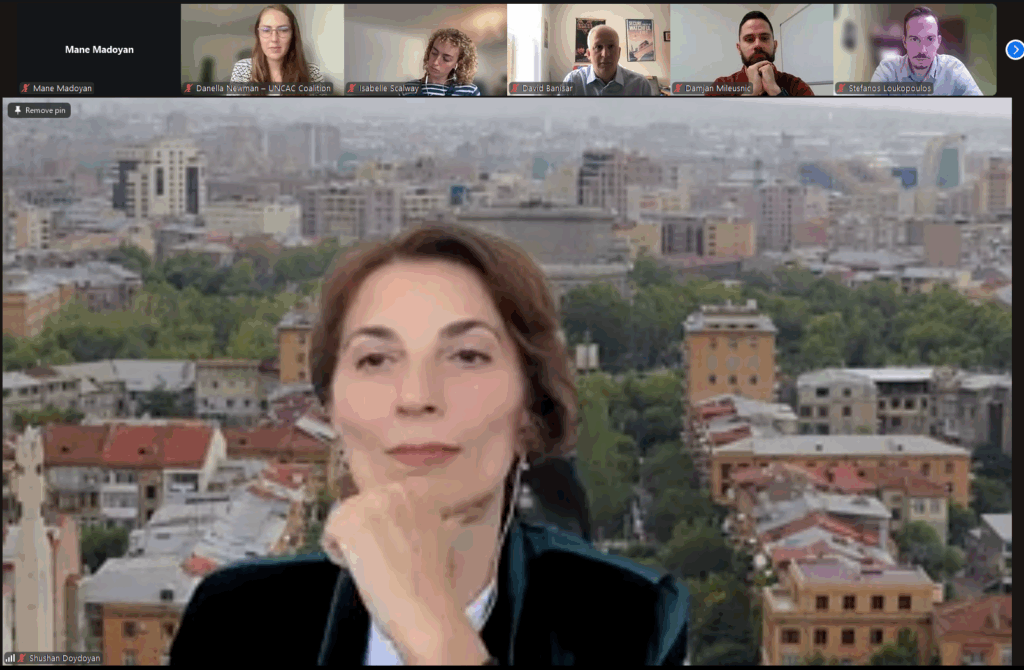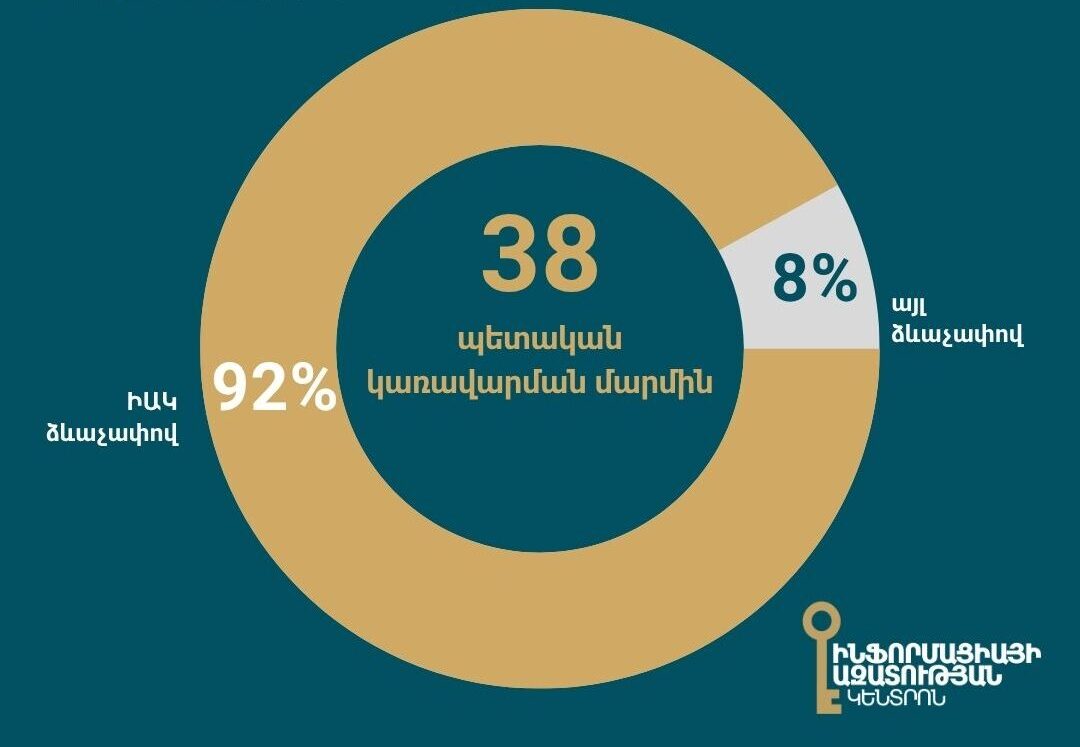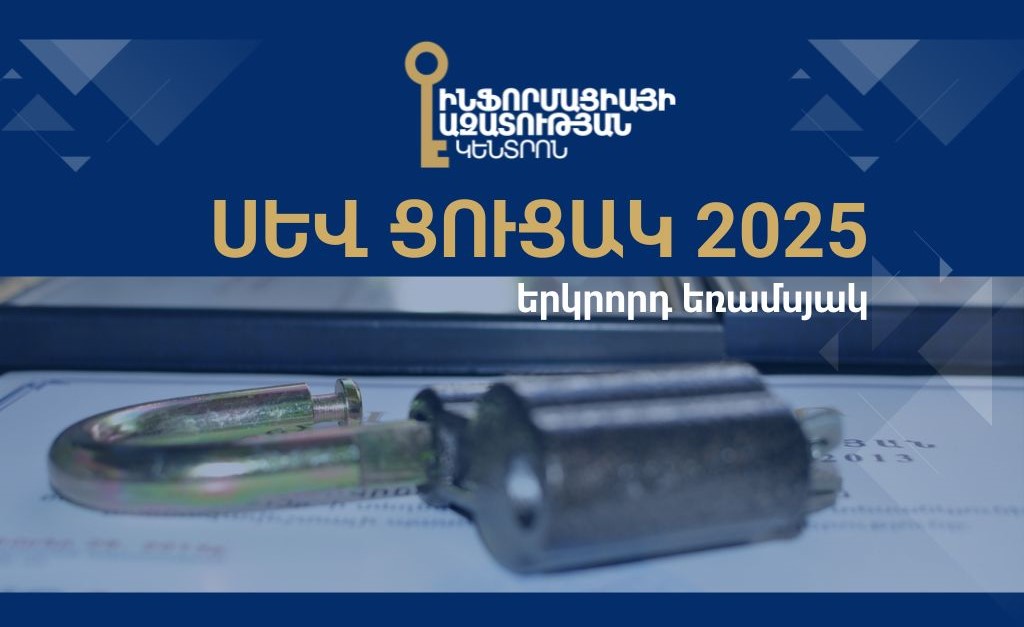The President of the Freedom of Information Center of Armenia (FOICA), Shushan Doydoyan, participated on September 23 in the 19th UNCAC Coalition Regional Meeting for Europe on “Regional priorities for CoSP11 & Using access to information in the fight against corruption.” She highlighted Armenia’s experience with proactive disclosure of information, its role in preventing corruption, and the challenges that remain in ensuring meaningful transparency.
Here is Ms. Doydoyan’s full speech delivered at the meeting:
UNCAC Coalition Regional Meeting
Dear members of the UNCAC Coalition,
It is my honor to speak at this important gathering of the coalition members. Access to information is a key driver to reveal corruption, to ensure transparency and accountability of the government. It’s a tool for the civil society and people to fulfill their rights and mission and become resilient towards critical challenges the civic space faces at present.
I will address today a topic of advancing the proactive disclosure of information based on the Armenian experience. As a nation committed to democratic reforms and strengthening public trust, Armenian Government recognizes that proactive transparency is a foundational pillar upon which a truly effective government could be built.
The Essence of Proactive Disclosure
There are two main ways by which information held by public bodies can be accessed by the public:
- Reactive disclosure: individual members of the public file information requests and receive information. Reactive access to information is fulfilled though information requests submitted by citizens, NGOs, journalists, businesses, youth to their governments.
- Proactive disclosure: information is made public at the initiative of the public body, without a request being filed. Proactive disclosure means publishing information without waiting for citizens to request it; making information public by default. This can be achieved using a multiplicity of means ranging from publications in official websites, social networks, publicly accessible notice boards, to radio and TV
Why Proactive Disclosure Matters?
Combating Corruption: This is perhaps the most obvious and direct impact. The UN Convention Against Corruption (UNCAC) includes proactive disclosure in the chapter on preventing corruption. UNCAC obliges Governments to publish information about matters that include: recruitment, promotion and retirement of civil servants; funding of candidatures and political parties; and public procurement systems. UNCAC also requires transparency of anti-corruption policies and the publication of periodic reports on the risks of corruption in the public administration. Proactive disclosure allows civil society, journalists, and citizens to act as independent watchdogs, identifying red flags and holding officials accountable. In recent case run by our organization FOICA, we helped local journalists get information about individual donations made to the ruling party during pre-electoral campaign. The publications of journalists based on the received data revealed wrongdoings of the ruling party as many individuals included in the donation lists denied their participation.
Meaningful participation: Disclosure of data and policy documents also ensures that the public has the information needed to participate in policy and decision-making processes. Dissemination by public bodies of information about how they function helps the public access government services. By sharing information proactively, transparency around policy choices is increased without people having to ask for it, which in its turn may enhance the trustworthiness of government.
Improving Governance Efficiency: Another benefit of proactive disclosure is that it encourages better information management, improves a public authority’s internal information flows, and thereby contributes to increased governance efficiency. Proactive disclosure forces public bodies to organize their information better, standardize data, and improve internal record-keeping. This can lead to more effective delivery of public services.
Problem-setting
Over 125 countries worldwide have currently enacted Access of Information Acts. Some leading countries have incorporated proactive disclosure into their ATI acts including Armenia. Armenian FOI law active since 2003 defines 13 categories of information which are subject to mandatory publication. Among them are budgets of state bodies, bios and contacts of state officials, procurement procedures, staff lists, hiring procedures, impact on environment, public events programs and many more. The law also requires publishing information based on the frequently asked questions made by the public. 5 information requests frequently made should be summarized and made available online.
Armenian central Government runs more than 108 online platforms of digital services (such as e-request.am for submission of applications and requests of citizens, e-draft.am a unified portal where citizens can view, discuss, and give feedback on draft laws and regulations or arlis.am – the Armenian Legal Information System, giving free online access to laws, decrees, and other normative acts, e-health.am – electronic health system for medical records, prescriptions, and health services). Every government body has an official website. They also run 236 official pages in social networks including Facebook, X and Youtube.
Annually, the government makes publicly available hundreds of documents but the key questions are what is published, where and when it is published and how it is published to ensure that the proactive disclosure is really useful and meaningful.
Yet, significant challenges persist.
- One key challenge is defining what kind of information governments should publish proactively. What counts as “information of public interest”? How to choose what should be prioritized? Of course, areas like education, health, social services, human rights, and the financial aid, climate change are among prioritized topics.
- Another key issue is how to publish this information volunteerly, what should be the publication format and platforms to be applied by the government bodies to ensure that information is accessible and understandable for every citizen. We notice that the information disclosed is often fragmented, not standardized, and sometimes difficult for the average citizen to find it or understand. Sharing government information only matters if it’s useful to people. Not just to publish more government data—but to make it useful, timely, and relevant to people.
- The quality, timeliness, and completeness of proactively disclosed information are crucial. Information that is outdated, incomplete, or buried in obscure corners of a website does little to enhance transparency. Furthermore, the technical capacity for data management and publication within various state bodies varies considerably, leading to inconsistencies.
- Another issue is ensuring that exceptions (for privacy protection, national security, commercial confidentiality) are narrowly and clearly defined, and balanced with public interest.
- While there is increasing consistency in proactive disclosure across countries, no international standard has yet been developed. Proactive disclosure has not yet been translated into clear standards to guide governments in determining which information should be released proactively and how.
- Lastly, Access to information became less popular and it constantly remained out of attention of the donor community limiting its impact and engagement.
Solution
To tackle these challenges and risks for the further advancement of proactive ATI, I see a few ways:
- To revitalize and reinforce access to information
Access to information is uncomfortable thing for all the governments in the world. And we know that it is a weapon in the hands of journalists and civil society to use and force the governments to be responsible and accountable. To join our efforts to help the civic space to continue its valuable struggle for information without which the struggle against corruption is cut off its energy. We shall keep empowering people, journalists and especially the youth to ask questions to their governments and to look for data. In order to prevent Access to information being shrank, we should come up with solutions on how to shift and reposition it within the context of ongoing reforms—such as open data initiatives and the growing influence of social networks. In Armenia, we tightly linked the advancement of ATI with the ongoing strategic communication reform defining comprehensive and detailed communication protocols for processing information requests and proactive disclosure of information for government information departments.
- What steps should be taken to make proactive disclosure effective –
Governments should ensure:
- Legal guarantees – categories of information subject to proactive disclosure should be clearly defined by the national legislation
- data must be usable in open, machine-readable, structured formats so reuse is possible.
- Information must be timely, relevant, and sufficiently detailed to enable citizen participation, oversight and corruption monitoring.
- Information must be complete and up to date.
- Technologies to be leveraged to make complex data more understandable and easily accessible for the general public.
- Identifying and Prioritizing High-Value Datasets:We should identify specific categories of information that have the greatest impact on anti-corruption efforts and public accountability. This includes detailed public expenditure data, comprehensive asset and income declarations of public officials (with appropriate privacy safeguards), public procurement contracts, beneficial ownership registers for companies bidding on public contracts, and performance data for public services.
- Ensuring comprehensive and continued support in order to reshape the future of access to information
In recent years, we’ve observed a concerning trend: a noticeable decrease in donor support for initiatives focused on access to information, coupled with a broader decline in the donor community’s interest in this critical area. This shift is particularly troubling given that robust ATI frameworks are fundamental to good governance and anti-corruption efforts. While development priorities are constantly evolving, the foundational role of access to information seems to be receiving less attention and financial backing than it warrants.
The donor community should be communicated with a message that proactive disclosure ensures success and impact of the civil society and it should be covered by their agenda more comprehensively. Without sustained support, efforts to strengthen legal frameworks, build institutional capacity, and promote digital transparency platforms may falter, potentially leading to a regression in government openness and an increased vulnerability to corruption. It is imperative that the donor community re-evaluate the strategic importance of access to information as an enabler of sustainable development and democratic resilience.
- Engaging Civil Society and the Public
Civil society organizations are invaluable partners in identifying information gaps, monitoring disclosure, and advocating for improvements. Mechanisms for public feedback on the accessibility and utility of disclosed information should be established. Educational campaigns can also raise public awareness about their right to information and the resources available.
The role of civil society is central in pushing the government bodies to fulfill their obligation of mandatory publication and to comply this fully according to the meaning of proactive disclosure. Our organization as the leading professional NGO in the field is conducting regular monitoring of government websites to ensure that shortcomings are revealed and those bodies which do not regularly publish information are properly named and shamed. Recently we filed 10 court cases against all 10 regional governments which failed to comply with legal obligations to fully publish the mandatory information. Golden key and Rusty Lock award ceremony is another tool for naming and shaming. These exercises of naming, shaming, punishing, and educating bring governments into the public spotlight.
- Contributing to the establishment of international standards of proactive disclosure: Strategic approach
Creating such a standard requires further exploration and international cooperation. It is important for the frontrunners to come together and agree on a minimum standard for proactive disclosure. This could also encourage other countries to incorporate proactive disclosure into their access to information legislation. The coalition of frontrunner countries of Netherlands, Scotland, Armenia, Brazil, Canada, Croatia, Germany, Romania, Scotland and Spain come together to join their efforts towards developing such standards with participation of OGP and OECD. This initiative will be officially launched at the OGP Summit in October. The standard introduces the concept of meaningful proactive disclosure. Citizens and governments alike do not benefit from the bulk publication of documents. A key consideration is whether the implementation burden justifies the benefits, i.e., what information do citizens need and how can be published it in a way that is useful.
- A central focus should be on meaningful transparency – not merely maximizing the volume of proactively disclosed information, but making deliberate choices about what is disclosed and how.
- The aim is to be as ambitious as possible, while remaining inclusive: participation is open to countries that prioritize meaningful, proactive transparency, even if their national context is not yet fully developed in this area.
- Insight and best practices will be gathered on the implementation of proactive disclosure policies across countries. These initiatives could provide valuable input in defining both the minimum threshold (lowest common denominator) and ambitious recommendations, as well as identifying strong examples of effective disclosure.
The joint initiative for an international standard for proactive disclosure will be presented at the OGP Global Summit and the OECD Working Party on Open Government Meeting in Vitoria-Gasteiz, Spain. Based on the input of countries in the coalition of frontrunners, and in close collaboration with the partners, an iterative process will be followed to further develop and ultimately establish an international standard for proactive disclosure.
Conclusion
Advancing proactive disclosure in Armenia and globally is an ongoing journey. It requires sustained political will, consistent effort from public institutions, and active engagement from the donor community, as well as civil society and citizens. It is a powerful antidote to corruption, a catalyst for good governance, and a cornerstone of a resilient democracy. The UNCAC Coalition’s support and expertise are invaluable as we continue on this path.










